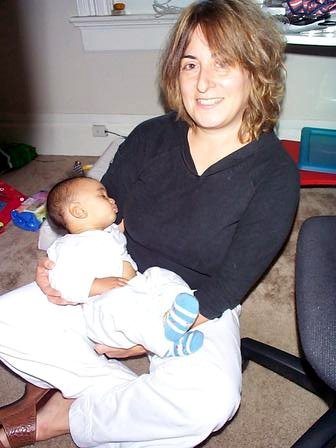The Elephant Search
It was a huge relief to finally drop Alisa off at the SNIT Hospital in Accra, and leave her in the care of doctors and nurses and an IV drip. We pulled up to Geekhalla, the Geekcorps residence, next to the American Embassy in Osu. As we unloaded our backpacks, baskets, and the guinea fowl, I was so tired I slipped and my leg went straight into the open sewer by the side of the dusty road.
After a day of IV rehydration, Alisa turned out fine though a lot smaller. But Kate and I remembered how thin the luck was that got us back to Accra in time enough, that we had a way to leave, that it wasn't quick-acting cerebral malaria, that Alisa had started out with plump enough hips to ride out her extremely quick weight loss.
So here in Sevare, Kate and I made sure to sleep this morning until we were refreshed and eat a slow and leisurely breakfast until we were full -- freshly baked bread, scrambled eggs, pancakes with maple syrup someone had brought from Vermont.
After breakfast, we were sitting around the table drinking tea, not quite ready to go outside to the dust's embrace, to the band of Tuareg tall-turban-wrapped-sword-sellers waiting by the compound gate. I remembered one woman from the communal dinner the night before who proudly showed us her bracelet of ancient quartz beads. I would have been impressed if I were not so ignorant as to the rarity of those beads, or if I didn't think she were showing off. Another woman worked for an NGO which advocated population control, and her early-twenties son and his fashionable girlfriend were visiting from the U.S. The girlfriend wore high heels in this duststorm haze, and I wondered how she managed walking in the sandy rutted streets of Sevare.
But the characters from last night's dinner were all out today, and we were here alone with Mac.
"How do we find the desert elephants in Gao?" we asked him, since he had been born and raised in Mali.
He told us to visit his French friend, Jacques, who was from Paris but resided in Gao. Jacques was in his fifties and had a nineteen-year-old new Malian wife.
"Find Jacques and he'll know how to find the elephants," Mac told us.
After a day of IV rehydration, Alisa turned out fine though a lot smaller. But Kate and I remembered how thin the luck was that got us back to Accra in time enough, that we had a way to leave, that it wasn't quick-acting cerebral malaria, that Alisa had started out with plump enough hips to ride out her extremely quick weight loss.
So here in Sevare, Kate and I made sure to sleep this morning until we were refreshed and eat a slow and leisurely breakfast until we were full -- freshly baked bread, scrambled eggs, pancakes with maple syrup someone had brought from Vermont.
After breakfast, we were sitting around the table drinking tea, not quite ready to go outside to the dust's embrace, to the band of Tuareg tall-turban-wrapped-sword-sellers waiting by the compound gate. I remembered one woman from the communal dinner the night before who proudly showed us her bracelet of ancient quartz beads. I would have been impressed if I were not so ignorant as to the rarity of those beads, or if I didn't think she were showing off. Another woman worked for an NGO which advocated population control, and her early-twenties son and his fashionable girlfriend were visiting from the U.S. The girlfriend wore high heels in this duststorm haze, and I wondered how she managed walking in the sandy rutted streets of Sevare.
But the characters from last night's dinner were all out today, and we were here alone with Mac.
"How do we find the desert elephants in Gao?" we asked him, since he had been born and raised in Mali.
He told us to visit his French friend, Jacques, who was from Paris but resided in Gao. Jacques was in his fifties and had a nineteen-year-old new Malian wife.
"Find Jacques and he'll know how to find the elephants," Mac told us.

